Entrepreneurship Report: Concept, Types of Enterprises, Significance
VerifiedAdded on 2023/06/17
|10
|3051
|346
Report
AI Summary
This report provides a comprehensive overview of entrepreneurship, starting with a definition of the concept and exploring various theories. It analyzes different types of enterprises, including sole proprietorships, partnerships, private and public limited companies, and cooperative enterprises. The report further examines the significance of entrepreneurship to individuals, organizations, and the economy at large, highlighting its role in wealth creation, innovation, job creation, and social welfare. The examples of successful entrepreneurs are used to illustrate the impact of an entrepreneurial mindset. Desklib offers a wealth of resources, including solved assignments and past papers, to support students in their academic endeavors.

Entrepreneurship in Business
Paraphrase This Document
Need a fresh take? Get an instant paraphrase of this document with our AI Paraphraser

Table of Contents
Introduction......................................................................................................................................1
Main Body.......................................................................................................................................1
Explain the concept of entrepreneurship and its various theories..........................................1
Analyse various types of enterprises......................................................................................3
Examine the significance of entrepreneurship to the individual, organisation and the economy
at large....................................................................................................................................5
Conclusion.......................................................................................................................................7
References........................................................................................................................................8
Introduction......................................................................................................................................1
Main Body.......................................................................................................................................1
Explain the concept of entrepreneurship and its various theories..........................................1
Analyse various types of enterprises......................................................................................3
Examine the significance of entrepreneurship to the individual, organisation and the economy
at large....................................................................................................................................5
Conclusion.......................................................................................................................................7
References........................................................................................................................................8
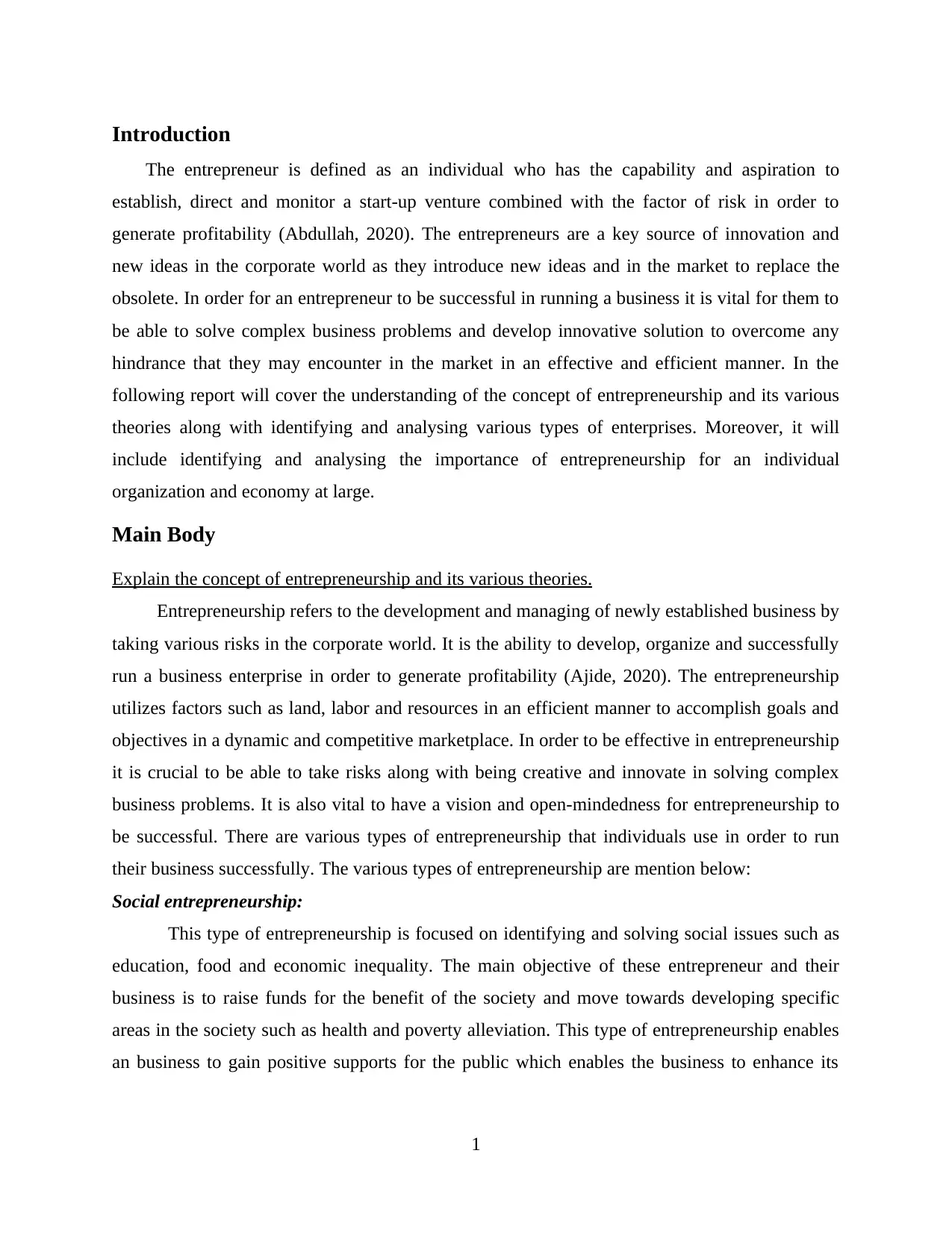
Introduction
The entrepreneur is defined as an individual who has the capability and aspiration to
establish, direct and monitor a start-up venture combined with the factor of risk in order to
generate profitability (Abdullah, 2020). The entrepreneurs are a key source of innovation and
new ideas in the corporate world as they introduce new ideas and in the market to replace the
obsolete. In order for an entrepreneur to be successful in running a business it is vital for them to
be able to solve complex business problems and develop innovative solution to overcome any
hindrance that they may encounter in the market in an effective and efficient manner. In the
following report will cover the understanding of the concept of entrepreneurship and its various
theories along with identifying and analysing various types of enterprises. Moreover, it will
include identifying and analysing the importance of entrepreneurship for an individual
organization and economy at large.
Main Body
Explain the concept of entrepreneurship and its various theories.
Entrepreneurship refers to the development and managing of newly established business by
taking various risks in the corporate world. It is the ability to develop, organize and successfully
run a business enterprise in order to generate profitability (Ajide, 2020). The entrepreneurship
utilizes factors such as land, labor and resources in an efficient manner to accomplish goals and
objectives in a dynamic and competitive marketplace. In order to be effective in entrepreneurship
it is crucial to be able to take risks along with being creative and innovate in solving complex
business problems. It is also vital to have a vision and open-mindedness for entrepreneurship to
be successful. There are various types of entrepreneurship that individuals use in order to run
their business successfully. The various types of entrepreneurship are mention below:
Social entrepreneurship:
This type of entrepreneurship is focused on identifying and solving social issues such as
education, food and economic inequality. The main objective of these entrepreneur and their
business is to raise funds for the benefit of the society and move towards developing specific
areas in the society such as health and poverty alleviation. This type of entrepreneurship enables
an business to gain positive supports for the public which enables the business to enhance its
1
The entrepreneur is defined as an individual who has the capability and aspiration to
establish, direct and monitor a start-up venture combined with the factor of risk in order to
generate profitability (Abdullah, 2020). The entrepreneurs are a key source of innovation and
new ideas in the corporate world as they introduce new ideas and in the market to replace the
obsolete. In order for an entrepreneur to be successful in running a business it is vital for them to
be able to solve complex business problems and develop innovative solution to overcome any
hindrance that they may encounter in the market in an effective and efficient manner. In the
following report will cover the understanding of the concept of entrepreneurship and its various
theories along with identifying and analysing various types of enterprises. Moreover, it will
include identifying and analysing the importance of entrepreneurship for an individual
organization and economy at large.
Main Body
Explain the concept of entrepreneurship and its various theories.
Entrepreneurship refers to the development and managing of newly established business by
taking various risks in the corporate world. It is the ability to develop, organize and successfully
run a business enterprise in order to generate profitability (Ajide, 2020). The entrepreneurship
utilizes factors such as land, labor and resources in an efficient manner to accomplish goals and
objectives in a dynamic and competitive marketplace. In order to be effective in entrepreneurship
it is crucial to be able to take risks along with being creative and innovate in solving complex
business problems. It is also vital to have a vision and open-mindedness for entrepreneurship to
be successful. There are various types of entrepreneurship that individuals use in order to run
their business successfully. The various types of entrepreneurship are mention below:
Social entrepreneurship:
This type of entrepreneurship is focused on identifying and solving social issues such as
education, food and economic inequality. The main objective of these entrepreneur and their
business is to raise funds for the benefit of the society and move towards developing specific
areas in the society such as health and poverty alleviation. This type of entrepreneurship enables
an business to gain positive supports for the public which enables the business to enhance its
1
⊘ This is a preview!⊘
Do you want full access?
Subscribe today to unlock all pages.

Trusted by 1+ million students worldwide
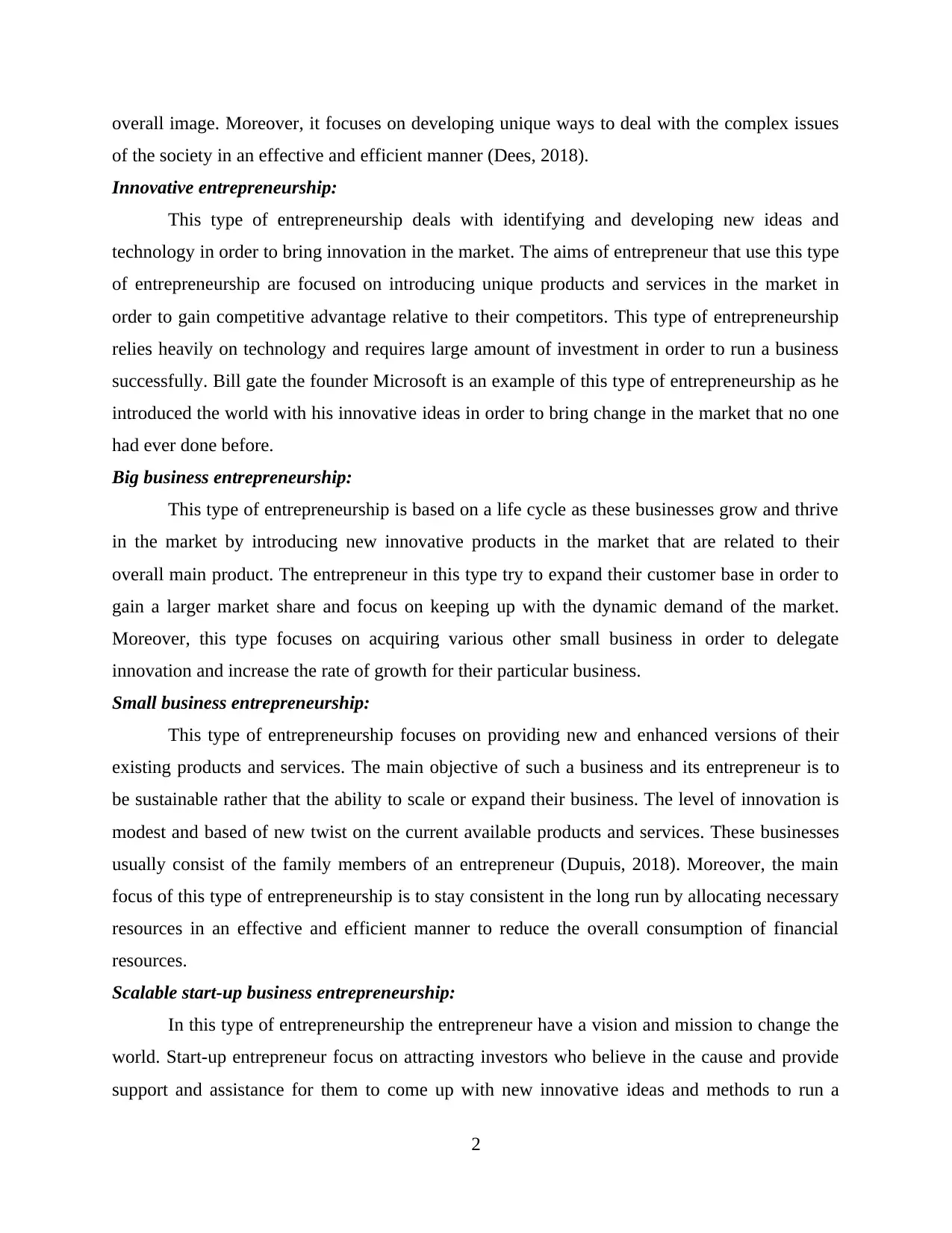
overall image. Moreover, it focuses on developing unique ways to deal with the complex issues
of the society in an effective and efficient manner (Dees, 2018).
Innovative entrepreneurship:
This type of entrepreneurship deals with identifying and developing new ideas and
technology in order to bring innovation in the market. The aims of entrepreneur that use this type
of entrepreneurship are focused on introducing unique products and services in the market in
order to gain competitive advantage relative to their competitors. This type of entrepreneurship
relies heavily on technology and requires large amount of investment in order to run a business
successfully. Bill gate the founder Microsoft is an example of this type of entrepreneurship as he
introduced the world with his innovative ideas in order to bring change in the market that no one
had ever done before.
Big business entrepreneurship:
This type of entrepreneurship is based on a life cycle as these businesses grow and thrive
in the market by introducing new innovative products in the market that are related to their
overall main product. The entrepreneur in this type try to expand their customer base in order to
gain a larger market share and focus on keeping up with the dynamic demand of the market.
Moreover, this type focuses on acquiring various other small business in order to delegate
innovation and increase the rate of growth for their particular business.
Small business entrepreneurship:
This type of entrepreneurship focuses on providing new and enhanced versions of their
existing products and services. The main objective of such a business and its entrepreneur is to
be sustainable rather that the ability to scale or expand their business. The level of innovation is
modest and based of new twist on the current available products and services. These businesses
usually consist of the family members of an entrepreneur (Dupuis, 2018). Moreover, the main
focus of this type of entrepreneurship is to stay consistent in the long run by allocating necessary
resources in an effective and efficient manner to reduce the overall consumption of financial
resources.
Scalable start-up business entrepreneurship:
In this type of entrepreneurship the entrepreneur have a vision and mission to change the
world. Start-up entrepreneur focus on attracting investors who believe in the cause and provide
support and assistance for them to come up with new innovative ideas and methods to run a
2
of the society in an effective and efficient manner (Dees, 2018).
Innovative entrepreneurship:
This type of entrepreneurship deals with identifying and developing new ideas and
technology in order to bring innovation in the market. The aims of entrepreneur that use this type
of entrepreneurship are focused on introducing unique products and services in the market in
order to gain competitive advantage relative to their competitors. This type of entrepreneurship
relies heavily on technology and requires large amount of investment in order to run a business
successfully. Bill gate the founder Microsoft is an example of this type of entrepreneurship as he
introduced the world with his innovative ideas in order to bring change in the market that no one
had ever done before.
Big business entrepreneurship:
This type of entrepreneurship is based on a life cycle as these businesses grow and thrive
in the market by introducing new innovative products in the market that are related to their
overall main product. The entrepreneur in this type try to expand their customer base in order to
gain a larger market share and focus on keeping up with the dynamic demand of the market.
Moreover, this type focuses on acquiring various other small business in order to delegate
innovation and increase the rate of growth for their particular business.
Small business entrepreneurship:
This type of entrepreneurship focuses on providing new and enhanced versions of their
existing products and services. The main objective of such a business and its entrepreneur is to
be sustainable rather that the ability to scale or expand their business. The level of innovation is
modest and based of new twist on the current available products and services. These businesses
usually consist of the family members of an entrepreneur (Dupuis, 2018). Moreover, the main
focus of this type of entrepreneurship is to stay consistent in the long run by allocating necessary
resources in an effective and efficient manner to reduce the overall consumption of financial
resources.
Scalable start-up business entrepreneurship:
In this type of entrepreneurship the entrepreneur have a vision and mission to change the
world. Start-up entrepreneur focus on attracting investors who believe in the cause and provide
support and assistance for them to come up with new innovative ideas and methods to run a
2
Paraphrase This Document
Need a fresh take? Get an instant paraphrase of this document with our AI Paraphraser
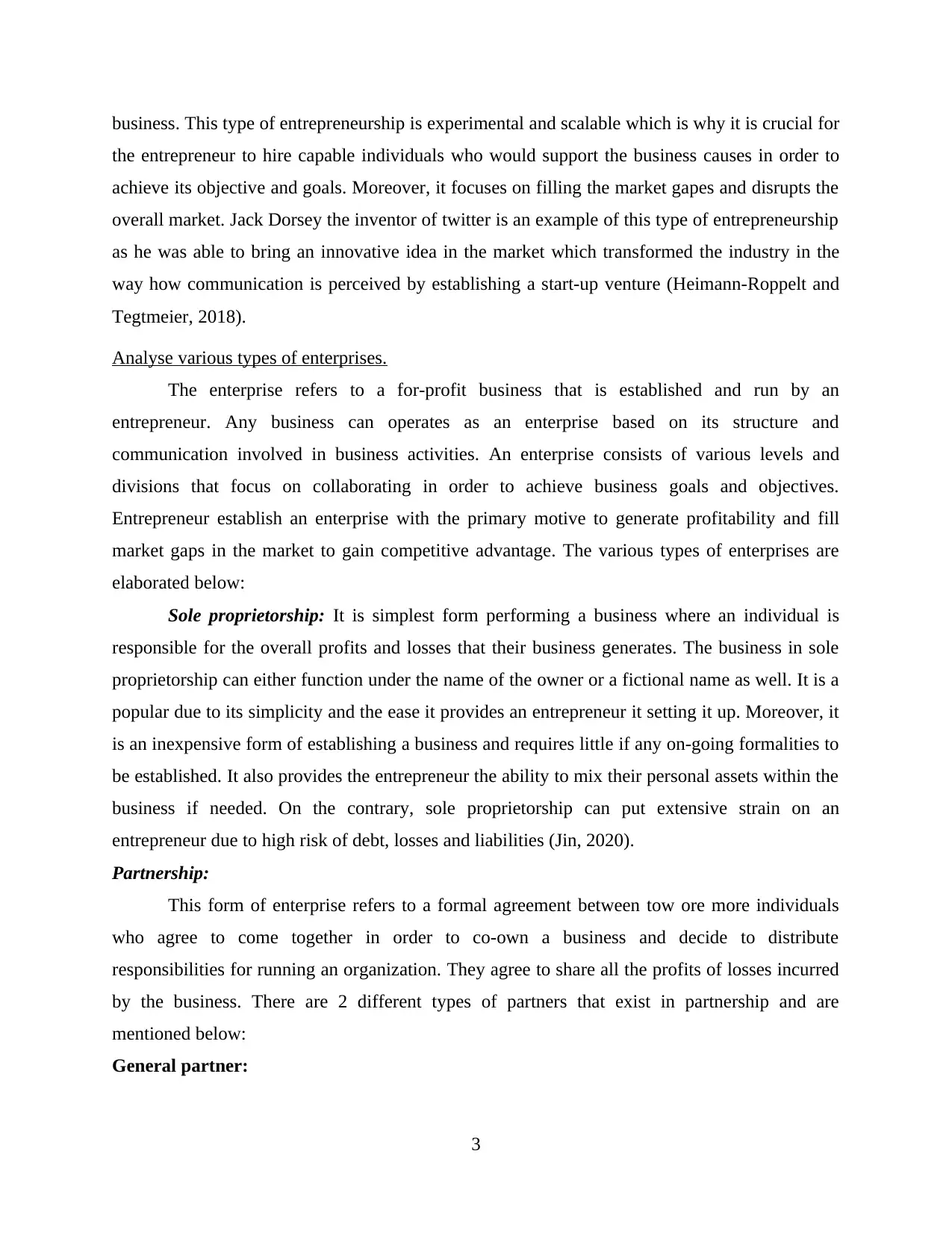
business. This type of entrepreneurship is experimental and scalable which is why it is crucial for
the entrepreneur to hire capable individuals who would support the business causes in order to
achieve its objective and goals. Moreover, it focuses on filling the market gapes and disrupts the
overall market. Jack Dorsey the inventor of twitter is an example of this type of entrepreneurship
as he was able to bring an innovative idea in the market which transformed the industry in the
way how communication is perceived by establishing a start-up venture (Heimann-Roppelt and
Tegtmeier, 2018).
Analyse various types of enterprises.
The enterprise refers to a for-profit business that is established and run by an
entrepreneur. Any business can operates as an enterprise based on its structure and
communication involved in business activities. An enterprise consists of various levels and
divisions that focus on collaborating in order to achieve business goals and objectives.
Entrepreneur establish an enterprise with the primary motive to generate profitability and fill
market gaps in the market to gain competitive advantage. The various types of enterprises are
elaborated below:
Sole proprietorship: It is simplest form performing a business where an individual is
responsible for the overall profits and losses that their business generates. The business in sole
proprietorship can either function under the name of the owner or a fictional name as well. It is a
popular due to its simplicity and the ease it provides an entrepreneur it setting it up. Moreover, it
is an inexpensive form of establishing a business and requires little if any on-going formalities to
be established. It also provides the entrepreneur the ability to mix their personal assets within the
business if needed. On the contrary, sole proprietorship can put extensive strain on an
entrepreneur due to high risk of debt, losses and liabilities (Jin, 2020).
Partnership:
This form of enterprise refers to a formal agreement between tow ore more individuals
who agree to come together in order to co-own a business and decide to distribute
responsibilities for running an organization. They agree to share all the profits of losses incurred
by the business. There are 2 different types of partners that exist in partnership and are
mentioned below:
General partner:
3
the entrepreneur to hire capable individuals who would support the business causes in order to
achieve its objective and goals. Moreover, it focuses on filling the market gapes and disrupts the
overall market. Jack Dorsey the inventor of twitter is an example of this type of entrepreneurship
as he was able to bring an innovative idea in the market which transformed the industry in the
way how communication is perceived by establishing a start-up venture (Heimann-Roppelt and
Tegtmeier, 2018).
Analyse various types of enterprises.
The enterprise refers to a for-profit business that is established and run by an
entrepreneur. Any business can operates as an enterprise based on its structure and
communication involved in business activities. An enterprise consists of various levels and
divisions that focus on collaborating in order to achieve business goals and objectives.
Entrepreneur establish an enterprise with the primary motive to generate profitability and fill
market gaps in the market to gain competitive advantage. The various types of enterprises are
elaborated below:
Sole proprietorship: It is simplest form performing a business where an individual is
responsible for the overall profits and losses that their business generates. The business in sole
proprietorship can either function under the name of the owner or a fictional name as well. It is a
popular due to its simplicity and the ease it provides an entrepreneur it setting it up. Moreover, it
is an inexpensive form of establishing a business and requires little if any on-going formalities to
be established. It also provides the entrepreneur the ability to mix their personal assets within the
business if needed. On the contrary, sole proprietorship can put extensive strain on an
entrepreneur due to high risk of debt, losses and liabilities (Jin, 2020).
Partnership:
This form of enterprise refers to a formal agreement between tow ore more individuals
who agree to come together in order to co-own a business and decide to distribute
responsibilities for running an organization. They agree to share all the profits of losses incurred
by the business. There are 2 different types of partners that exist in partnership and are
mentioned below:
General partner:
3
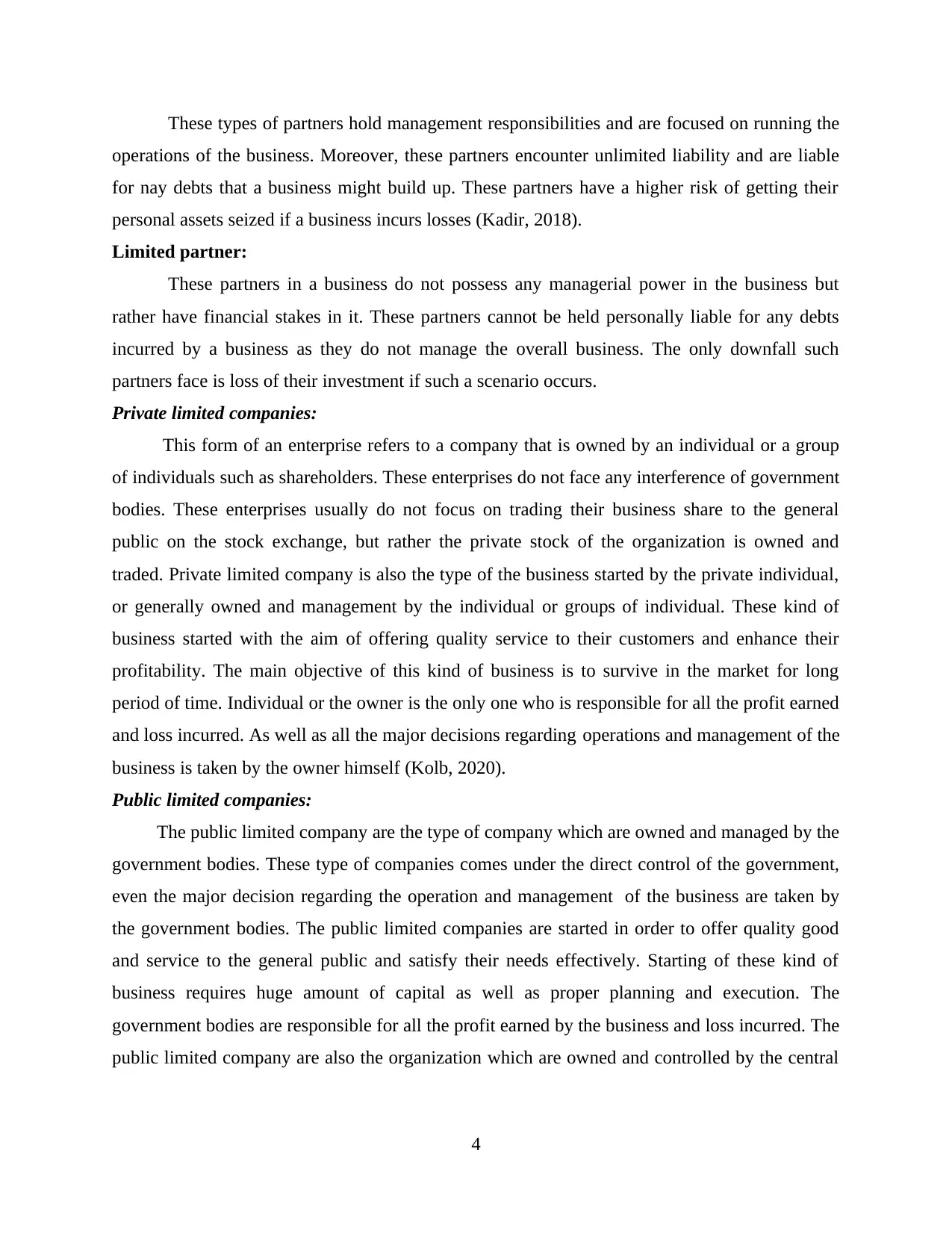
These types of partners hold management responsibilities and are focused on running the
operations of the business. Moreover, these partners encounter unlimited liability and are liable
for nay debts that a business might build up. These partners have a higher risk of getting their
personal assets seized if a business incurs losses (Kadir, 2018).
Limited partner:
These partners in a business do not possess any managerial power in the business but
rather have financial stakes in it. These partners cannot be held personally liable for any debts
incurred by a business as they do not manage the overall business. The only downfall such
partners face is loss of their investment if such a scenario occurs.
Private limited companies:
This form of an enterprise refers to a company that is owned by an individual or a group
of individuals such as shareholders. These enterprises do not face any interference of government
bodies. These enterprises usually do not focus on trading their business share to the general
public on the stock exchange, but rather the private stock of the organization is owned and
traded. Private limited company is also the type of the business started by the private individual,
or generally owned and management by the individual or groups of individual. These kind of
business started with the aim of offering quality service to their customers and enhance their
profitability. The main objective of this kind of business is to survive in the market for long
period of time. Individual or the owner is the only one who is responsible for all the profit earned
and loss incurred. As well as all the major decisions regarding operations and management of the
business is taken by the owner himself (Kolb, 2020).
Public limited companies:
The public limited company are the type of company which are owned and managed by the
government bodies. These type of companies comes under the direct control of the government,
even the major decision regarding the operation and management of the business are taken by
the government bodies. The public limited companies are started in order to offer quality good
and service to the general public and satisfy their needs effectively. Starting of these kind of
business requires huge amount of capital as well as proper planning and execution. The
government bodies are responsible for all the profit earned by the business and loss incurred. The
public limited company are also the organization which are owned and controlled by the central
4
operations of the business. Moreover, these partners encounter unlimited liability and are liable
for nay debts that a business might build up. These partners have a higher risk of getting their
personal assets seized if a business incurs losses (Kadir, 2018).
Limited partner:
These partners in a business do not possess any managerial power in the business but
rather have financial stakes in it. These partners cannot be held personally liable for any debts
incurred by a business as they do not manage the overall business. The only downfall such
partners face is loss of their investment if such a scenario occurs.
Private limited companies:
This form of an enterprise refers to a company that is owned by an individual or a group
of individuals such as shareholders. These enterprises do not face any interference of government
bodies. These enterprises usually do not focus on trading their business share to the general
public on the stock exchange, but rather the private stock of the organization is owned and
traded. Private limited company is also the type of the business started by the private individual,
or generally owned and management by the individual or groups of individual. These kind of
business started with the aim of offering quality service to their customers and enhance their
profitability. The main objective of this kind of business is to survive in the market for long
period of time. Individual or the owner is the only one who is responsible for all the profit earned
and loss incurred. As well as all the major decisions regarding operations and management of the
business is taken by the owner himself (Kolb, 2020).
Public limited companies:
The public limited company are the type of company which are owned and managed by the
government bodies. These type of companies comes under the direct control of the government,
even the major decision regarding the operation and management of the business are taken by
the government bodies. The public limited companies are started in order to offer quality good
and service to the general public and satisfy their needs effectively. Starting of these kind of
business requires huge amount of capital as well as proper planning and execution. The
government bodies are responsible for all the profit earned by the business and loss incurred. The
public limited company are also the organization which are owned and controlled by the central
4
⊘ This is a preview!⊘
Do you want full access?
Subscribe today to unlock all pages.

Trusted by 1+ million students worldwide
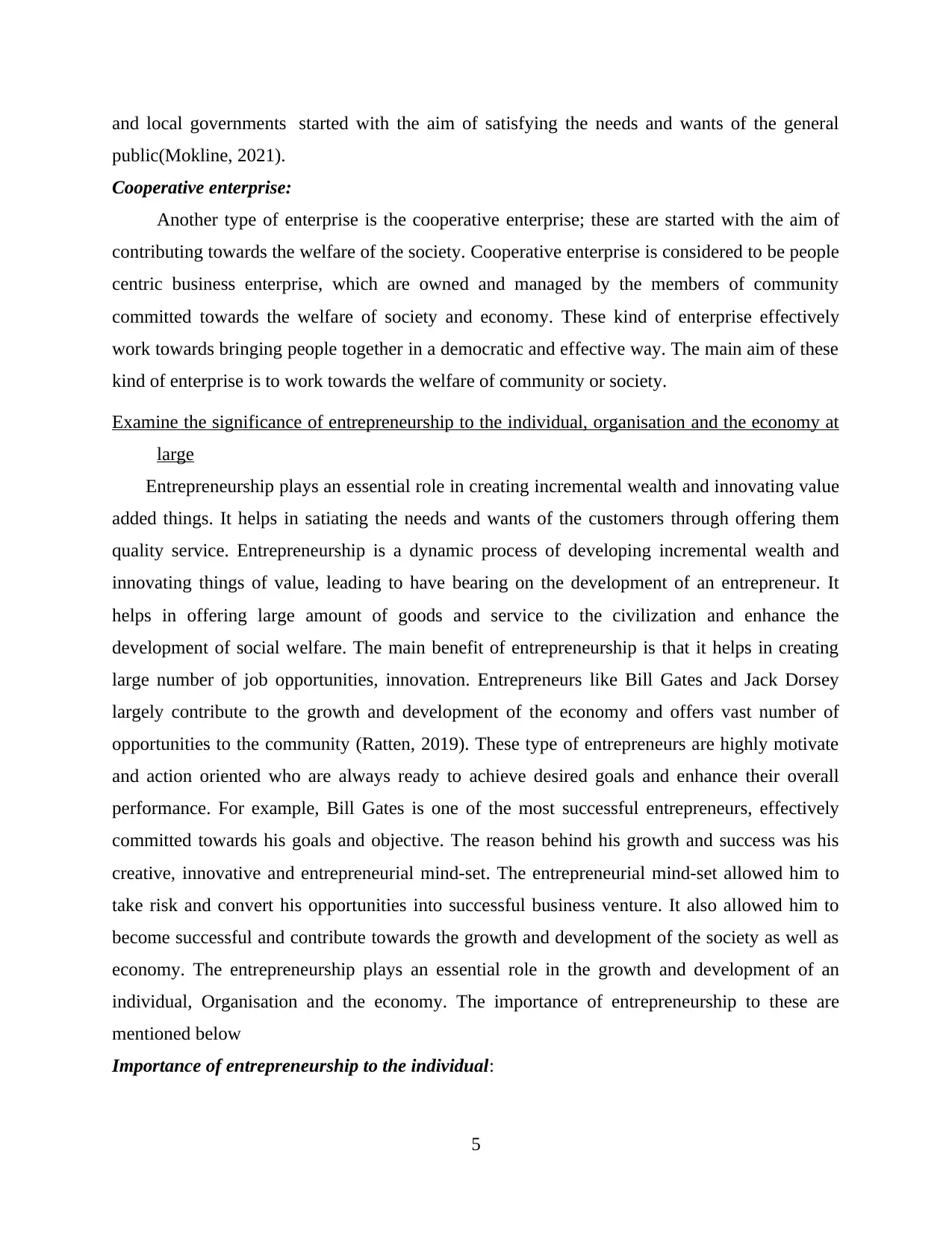
and local governments started with the aim of satisfying the needs and wants of the general
public(Mokline, 2021).
Cooperative enterprise:
Another type of enterprise is the cooperative enterprise; these are started with the aim of
contributing towards the welfare of the society. Cooperative enterprise is considered to be people
centric business enterprise, which are owned and managed by the members of community
committed towards the welfare of society and economy. These kind of enterprise effectively
work towards bringing people together in a democratic and effective way. The main aim of these
kind of enterprise is to work towards the welfare of community or society.
Examine the significance of entrepreneurship to the individual, organisation and the economy at
large
Entrepreneurship plays an essential role in creating incremental wealth and innovating value
added things. It helps in satiating the needs and wants of the customers through offering them
quality service. Entrepreneurship is a dynamic process of developing incremental wealth and
innovating things of value, leading to have bearing on the development of an entrepreneur. It
helps in offering large amount of goods and service to the civilization and enhance the
development of social welfare. The main benefit of entrepreneurship is that it helps in creating
large number of job opportunities, innovation. Entrepreneurs like Bill Gates and Jack Dorsey
largely contribute to the growth and development of the economy and offers vast number of
opportunities to the community (Ratten, 2019). These type of entrepreneurs are highly motivate
and action oriented who are always ready to achieve desired goals and enhance their overall
performance. For example, Bill Gates is one of the most successful entrepreneurs, effectively
committed towards his goals and objective. The reason behind his growth and success was his
creative, innovative and entrepreneurial mind-set. The entrepreneurial mind-set allowed him to
take risk and convert his opportunities into successful business venture. It also allowed him to
become successful and contribute towards the growth and development of the society as well as
economy. The entrepreneurship plays an essential role in the growth and development of an
individual, Organisation and the economy. The importance of entrepreneurship to these are
mentioned below
Importance of entrepreneurship to the individual:
5
public(Mokline, 2021).
Cooperative enterprise:
Another type of enterprise is the cooperative enterprise; these are started with the aim of
contributing towards the welfare of the society. Cooperative enterprise is considered to be people
centric business enterprise, which are owned and managed by the members of community
committed towards the welfare of society and economy. These kind of enterprise effectively
work towards bringing people together in a democratic and effective way. The main aim of these
kind of enterprise is to work towards the welfare of community or society.
Examine the significance of entrepreneurship to the individual, organisation and the economy at
large
Entrepreneurship plays an essential role in creating incremental wealth and innovating value
added things. It helps in satiating the needs and wants of the customers through offering them
quality service. Entrepreneurship is a dynamic process of developing incremental wealth and
innovating things of value, leading to have bearing on the development of an entrepreneur. It
helps in offering large amount of goods and service to the civilization and enhance the
development of social welfare. The main benefit of entrepreneurship is that it helps in creating
large number of job opportunities, innovation. Entrepreneurs like Bill Gates and Jack Dorsey
largely contribute to the growth and development of the economy and offers vast number of
opportunities to the community (Ratten, 2019). These type of entrepreneurs are highly motivate
and action oriented who are always ready to achieve desired goals and enhance their overall
performance. For example, Bill Gates is one of the most successful entrepreneurs, effectively
committed towards his goals and objective. The reason behind his growth and success was his
creative, innovative and entrepreneurial mind-set. The entrepreneurial mind-set allowed him to
take risk and convert his opportunities into successful business venture. It also allowed him to
become successful and contribute towards the growth and development of the society as well as
economy. The entrepreneurship plays an essential role in the growth and development of an
individual, Organisation and the economy. The importance of entrepreneurship to these are
mentioned below
Importance of entrepreneurship to the individual:
5
Paraphrase This Document
Need a fresh take? Get an instant paraphrase of this document with our AI Paraphraser
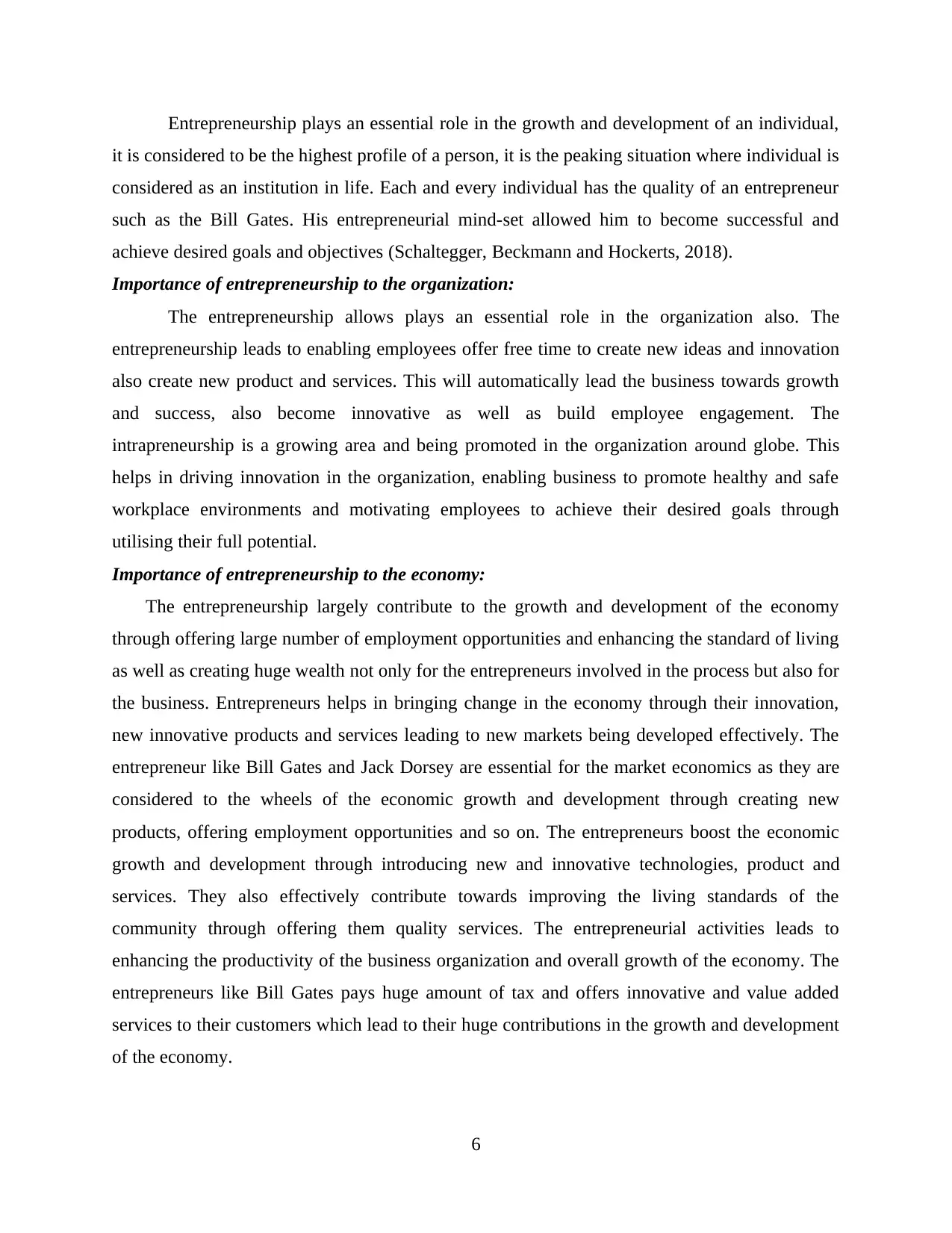
Entrepreneurship plays an essential role in the growth and development of an individual,
it is considered to be the highest profile of a person, it is the peaking situation where individual is
considered as an institution in life. Each and every individual has the quality of an entrepreneur
such as the Bill Gates. His entrepreneurial mind-set allowed him to become successful and
achieve desired goals and objectives (Schaltegger, Beckmann and Hockerts, 2018).
Importance of entrepreneurship to the organization:
The entrepreneurship allows plays an essential role in the organization also. The
entrepreneurship leads to enabling employees offer free time to create new ideas and innovation
also create new product and services. This will automatically lead the business towards growth
and success, also become innovative as well as build employee engagement. The
intrapreneurship is a growing area and being promoted in the organization around globe. This
helps in driving innovation in the organization, enabling business to promote healthy and safe
workplace environments and motivating employees to achieve their desired goals through
utilising their full potential.
Importance of entrepreneurship to the economy:
The entrepreneurship largely contribute to the growth and development of the economy
through offering large number of employment opportunities and enhancing the standard of living
as well as creating huge wealth not only for the entrepreneurs involved in the process but also for
the business. Entrepreneurs helps in bringing change in the economy through their innovation,
new innovative products and services leading to new markets being developed effectively. The
entrepreneur like Bill Gates and Jack Dorsey are essential for the market economics as they are
considered to the wheels of the economic growth and development through creating new
products, offering employment opportunities and so on. The entrepreneurs boost the economic
growth and development through introducing new and innovative technologies, product and
services. They also effectively contribute towards improving the living standards of the
community through offering them quality services. The entrepreneurial activities leads to
enhancing the productivity of the business organization and overall growth of the economy. The
entrepreneurs like Bill Gates pays huge amount of tax and offers innovative and value added
services to their customers which lead to their huge contributions in the growth and development
of the economy.
6
it is considered to be the highest profile of a person, it is the peaking situation where individual is
considered as an institution in life. Each and every individual has the quality of an entrepreneur
such as the Bill Gates. His entrepreneurial mind-set allowed him to become successful and
achieve desired goals and objectives (Schaltegger, Beckmann and Hockerts, 2018).
Importance of entrepreneurship to the organization:
The entrepreneurship allows plays an essential role in the organization also. The
entrepreneurship leads to enabling employees offer free time to create new ideas and innovation
also create new product and services. This will automatically lead the business towards growth
and success, also become innovative as well as build employee engagement. The
intrapreneurship is a growing area and being promoted in the organization around globe. This
helps in driving innovation in the organization, enabling business to promote healthy and safe
workplace environments and motivating employees to achieve their desired goals through
utilising their full potential.
Importance of entrepreneurship to the economy:
The entrepreneurship largely contribute to the growth and development of the economy
through offering large number of employment opportunities and enhancing the standard of living
as well as creating huge wealth not only for the entrepreneurs involved in the process but also for
the business. Entrepreneurs helps in bringing change in the economy through their innovation,
new innovative products and services leading to new markets being developed effectively. The
entrepreneur like Bill Gates and Jack Dorsey are essential for the market economics as they are
considered to the wheels of the economic growth and development through creating new
products, offering employment opportunities and so on. The entrepreneurs boost the economic
growth and development through introducing new and innovative technologies, product and
services. They also effectively contribute towards improving the living standards of the
community through offering them quality services. The entrepreneurial activities leads to
enhancing the productivity of the business organization and overall growth of the economy. The
entrepreneurs like Bill Gates pays huge amount of tax and offers innovative and value added
services to their customers which lead to their huge contributions in the growth and development
of the economy.
6
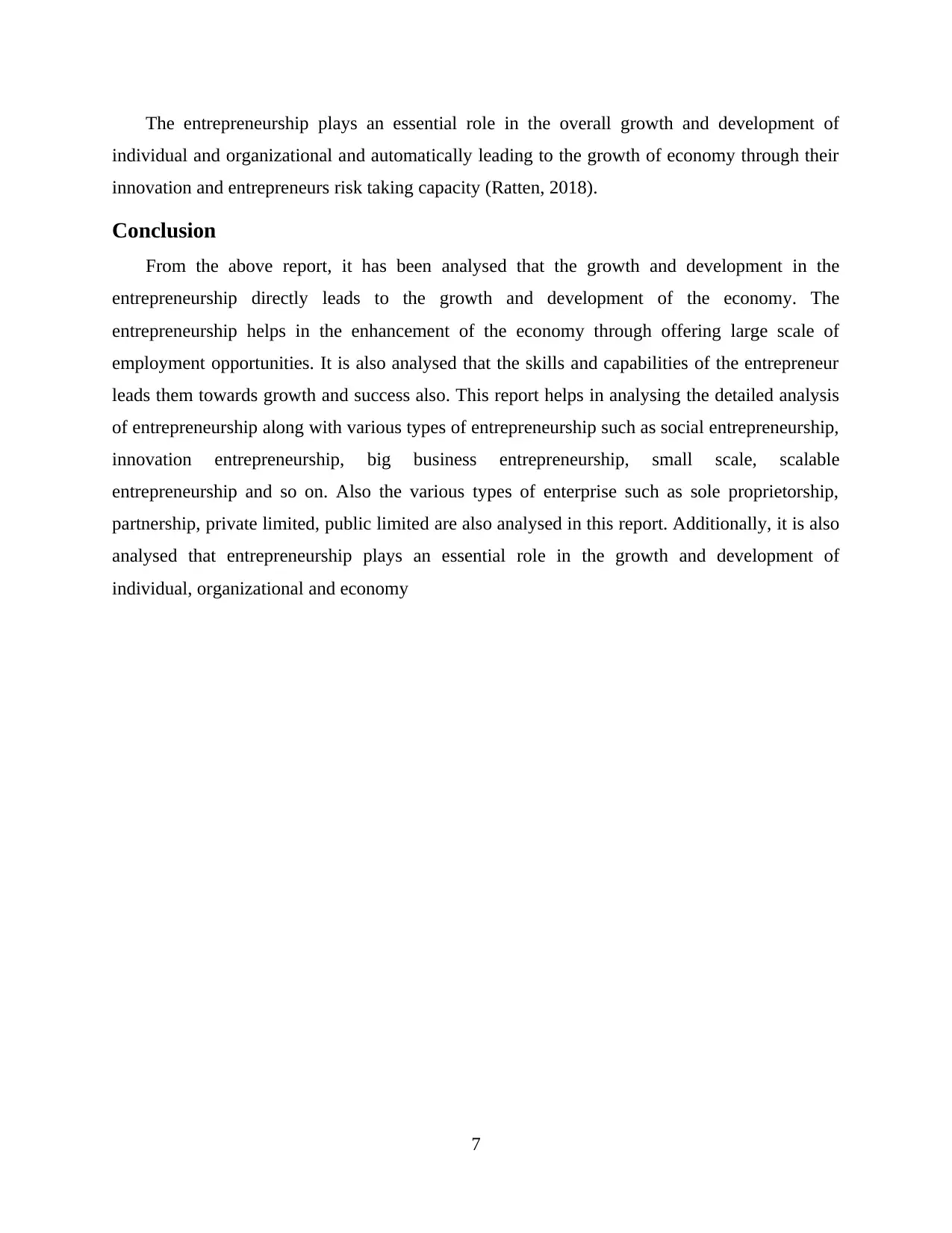
The entrepreneurship plays an essential role in the overall growth and development of
individual and organizational and automatically leading to the growth of economy through their
innovation and entrepreneurs risk taking capacity (Ratten, 2018).
Conclusion
From the above report, it has been analysed that the growth and development in the
entrepreneurship directly leads to the growth and development of the economy. The
entrepreneurship helps in the enhancement of the economy through offering large scale of
employment opportunities. It is also analysed that the skills and capabilities of the entrepreneur
leads them towards growth and success also. This report helps in analysing the detailed analysis
of entrepreneurship along with various types of entrepreneurship such as social entrepreneurship,
innovation entrepreneurship, big business entrepreneurship, small scale, scalable
entrepreneurship and so on. Also the various types of enterprise such as sole proprietorship,
partnership, private limited, public limited are also analysed in this report. Additionally, it is also
analysed that entrepreneurship plays an essential role in the growth and development of
individual, organizational and economy
7
individual and organizational and automatically leading to the growth of economy through their
innovation and entrepreneurs risk taking capacity (Ratten, 2018).
Conclusion
From the above report, it has been analysed that the growth and development in the
entrepreneurship directly leads to the growth and development of the economy. The
entrepreneurship helps in the enhancement of the economy through offering large scale of
employment opportunities. It is also analysed that the skills and capabilities of the entrepreneur
leads them towards growth and success also. This report helps in analysing the detailed analysis
of entrepreneurship along with various types of entrepreneurship such as social entrepreneurship,
innovation entrepreneurship, big business entrepreneurship, small scale, scalable
entrepreneurship and so on. Also the various types of enterprise such as sole proprietorship,
partnership, private limited, public limited are also analysed in this report. Additionally, it is also
analysed that entrepreneurship plays an essential role in the growth and development of
individual, organizational and economy
7
⊘ This is a preview!⊘
Do you want full access?
Subscribe today to unlock all pages.

Trusted by 1+ million students worldwide
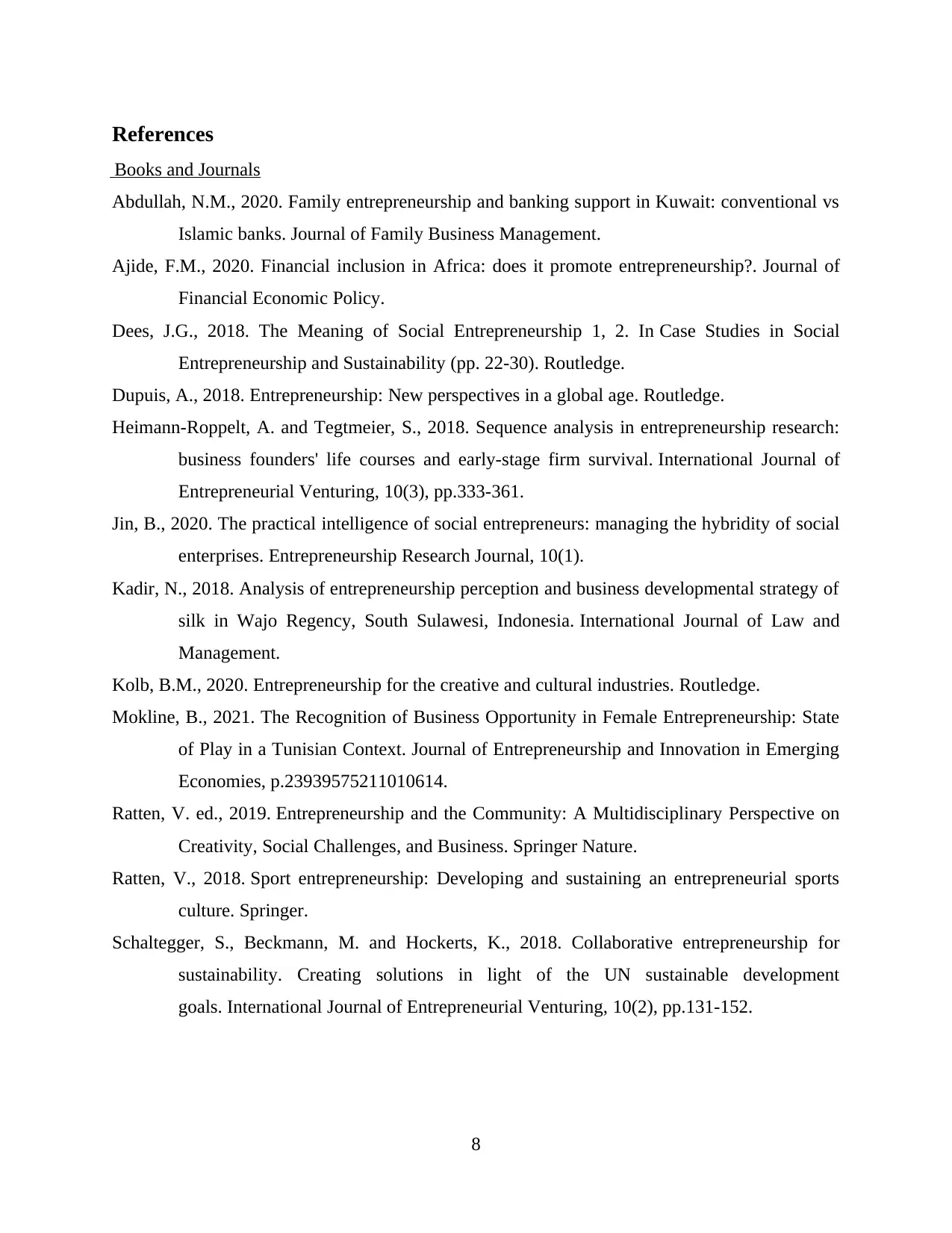
References
Books and Journals
Abdullah, N.M., 2020. Family entrepreneurship and banking support in Kuwait: conventional vs
Islamic banks. Journal of Family Business Management.
Ajide, F.M., 2020. Financial inclusion in Africa: does it promote entrepreneurship?. Journal of
Financial Economic Policy.
Dees, J.G., 2018. The Meaning of Social Entrepreneurship 1, 2. In Case Studies in Social
Entrepreneurship and Sustainability (pp. 22-30). Routledge.
Dupuis, A., 2018. Entrepreneurship: New perspectives in a global age. Routledge.
Heimann-Roppelt, A. and Tegtmeier, S., 2018. Sequence analysis in entrepreneurship research:
business founders' life courses and early-stage firm survival. International Journal of
Entrepreneurial Venturing, 10(3), pp.333-361.
Jin, B., 2020. The practical intelligence of social entrepreneurs: managing the hybridity of social
enterprises. Entrepreneurship Research Journal, 10(1).
Kadir, N., 2018. Analysis of entrepreneurship perception and business developmental strategy of
silk in Wajo Regency, South Sulawesi, Indonesia. International Journal of Law and
Management.
Kolb, B.M., 2020. Entrepreneurship for the creative and cultural industries. Routledge.
Mokline, B., 2021. The Recognition of Business Opportunity in Female Entrepreneurship: State
of Play in a Tunisian Context. Journal of Entrepreneurship and Innovation in Emerging
Economies, p.23939575211010614.
Ratten, V. ed., 2019. Entrepreneurship and the Community: A Multidisciplinary Perspective on
Creativity, Social Challenges, and Business. Springer Nature.
Ratten, V., 2018. Sport entrepreneurship: Developing and sustaining an entrepreneurial sports
culture. Springer.
Schaltegger, S., Beckmann, M. and Hockerts, K., 2018. Collaborative entrepreneurship for
sustainability. Creating solutions in light of the UN sustainable development
goals. International Journal of Entrepreneurial Venturing, 10(2), pp.131-152.
8
Books and Journals
Abdullah, N.M., 2020. Family entrepreneurship and banking support in Kuwait: conventional vs
Islamic banks. Journal of Family Business Management.
Ajide, F.M., 2020. Financial inclusion in Africa: does it promote entrepreneurship?. Journal of
Financial Economic Policy.
Dees, J.G., 2018. The Meaning of Social Entrepreneurship 1, 2. In Case Studies in Social
Entrepreneurship and Sustainability (pp. 22-30). Routledge.
Dupuis, A., 2018. Entrepreneurship: New perspectives in a global age. Routledge.
Heimann-Roppelt, A. and Tegtmeier, S., 2018. Sequence analysis in entrepreneurship research:
business founders' life courses and early-stage firm survival. International Journal of
Entrepreneurial Venturing, 10(3), pp.333-361.
Jin, B., 2020. The practical intelligence of social entrepreneurs: managing the hybridity of social
enterprises. Entrepreneurship Research Journal, 10(1).
Kadir, N., 2018. Analysis of entrepreneurship perception and business developmental strategy of
silk in Wajo Regency, South Sulawesi, Indonesia. International Journal of Law and
Management.
Kolb, B.M., 2020. Entrepreneurship for the creative and cultural industries. Routledge.
Mokline, B., 2021. The Recognition of Business Opportunity in Female Entrepreneurship: State
of Play in a Tunisian Context. Journal of Entrepreneurship and Innovation in Emerging
Economies, p.23939575211010614.
Ratten, V. ed., 2019. Entrepreneurship and the Community: A Multidisciplinary Perspective on
Creativity, Social Challenges, and Business. Springer Nature.
Ratten, V., 2018. Sport entrepreneurship: Developing and sustaining an entrepreneurial sports
culture. Springer.
Schaltegger, S., Beckmann, M. and Hockerts, K., 2018. Collaborative entrepreneurship for
sustainability. Creating solutions in light of the UN sustainable development
goals. International Journal of Entrepreneurial Venturing, 10(2), pp.131-152.
8
1 out of 10
Related Documents
Your All-in-One AI-Powered Toolkit for Academic Success.
+13062052269
info@desklib.com
Available 24*7 on WhatsApp / Email
![[object Object]](/_next/static/media/star-bottom.7253800d.svg)
Unlock your academic potential
Copyright © 2020–2026 A2Z Services. All Rights Reserved. Developed and managed by ZUCOL.



